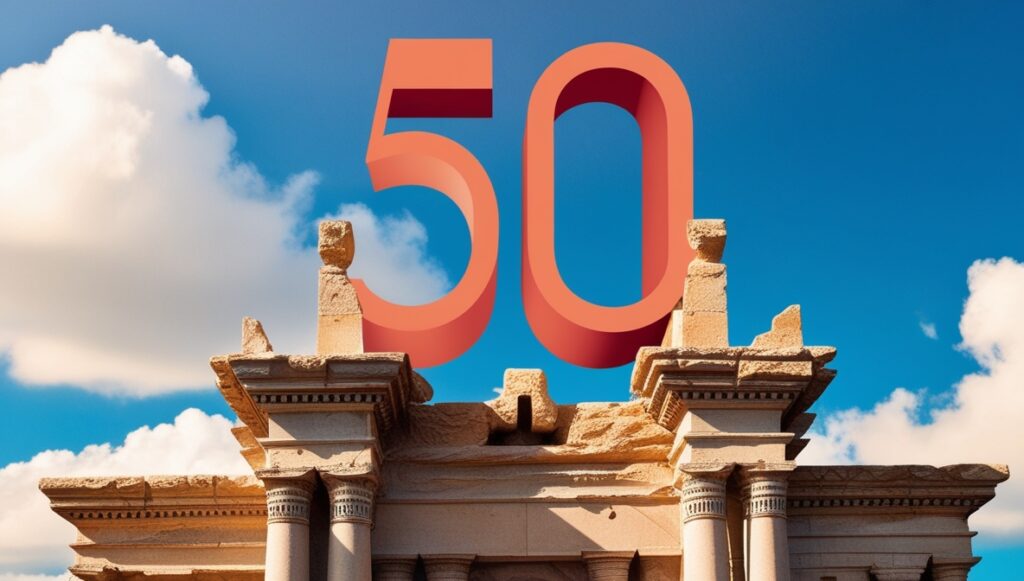The Meaning of Number 50 in the Bible carries profound significance that extends beyond mere numerology.
This powerful number appears at pivotal moments in both the Old and New Testaments, symbolizing freedom, divine intervention, and spiritual transformation.
Whether it’s linked to the Jubilee year of restoration, the outpouring of the Holy Spirit at Pentecost, or even the age at which the Levites retired, the number 50 has deep spiritual meaning.
This blog post explores the multiple dimensions of the number 50 in biblical numerology. We’ll dive into its implications for both ancient Israel and the early Christian Church.
Through examining historical events, scriptures, and spiritual teachings, we’ll uncover the richness of the biblical significance of the number 50.
Biblical Numerology: Understanding Numbers in the Bible
Biblical numerology is the study of the spiritual significance of numbers in the Bible.
Numbers in scripture often serve as more than just counting tools they convey deeper spiritual truths, divine messages, and prophecies.
In the Bible, numerology is deeply connected to God’s divine plan. Each number represents specific themes and meanings. For example:
- Seven often symbolizes completeness or perfection (Genesis 2:2, God rested on the seventh day).
- Twelve represents God’s people, seen in the Twelve Tribes of Israel and the Twelve Apostles.
- Forty symbolizes testing or trial, as seen in the 40 days of Moses’ fast and Christ’s 40-day fast in the wilderness.
So, what does the number 50 mean spiritually? The number 50 is frequently tied to freedom, restoration, and spiritual transformation.
The Spiritual Weight of the Number 50

The number 50 signifies completion and fullness, marking a significant period of transition or fulfillment.
In biblical numerology, it often represents a cycle of renewal or restoration. This meaning is clearly seen in its association with major events and rituals in the Bible.
The most notable occurrences of the number 50 in the Bible include:
- The Jubilee year, a time of freedom and restoration (Leviticus 25).
- The Pentecost, marking the descent of the Holy Spirit (Acts 2).
- The age at which the Levites retired from active service in the Temple (Numbers 8:25).
As we explore these events, it becomes clear that 50 is a marker of divine grace, a symbol of God’s mercy and His plan to bring about freedom, peace, and spiritual transformation for His people.
The Year of Jubilee: A Year of Freedom and Restoration
The Jubilee year, which occurred every 50th year in ancient Israel, was an incredibly important part of Levitical Law.
It was a time of freedom, restoration, and divine mercy. During the Jubilee, all land that had been sold was returned to its original owners, and any Israelite slaves were set free.
Key Aspects of the Jubilee:
- Debt forgiveness: People were released from financial burdens and given a fresh start.
- Land restoration: Property that had been sold during difficult times was returned to its rightful owners.
- Freedom for slaves: Israelites who had sold themselves into slavery were given freedom.
The Jubilee year provided a powerful symbol of God’s providence and His desire for His people to experience both physical and spiritual freedom.
It was a reminder of the covenant between God and Israel, a divine promise of restoration and mercy.
In biblical numerology, the number 50 in this context represents the culmination of God’s grace, as people were restored to their rightful positions after a cycle of labor or oppression.
It’s a spiritual reminder that God’s divine intervention brings about freedom, both for individuals and communities.
Pentecost: The Holy Spirit’s Descent on the 50th Day

The number 50 takes on special significance in the New Testament, particularly in connection with Pentecost.
Pentecost is celebrated 50 days after Easter (or the Feast of First Fruits) and marks the day when the Holy Spirit descended on the disciples of Jesus in Jerusalem.
Why 50 Days After Easter?
Pentecost, which is also known as Shavuot in Jewish tradition, takes place 50 days after the resurrection of Jesus Christ.
This day is significant because it marks the fulfillment of Jesus’ promise that the Holy Spirit would come to empower His followers.
- Acts 2:1-4 describes how, on the day of Pentecost, the Holy Spirit came upon the disciples with tongues of fire.
- The disciples began speaking in different languages, proclaiming God’s glory to all who were present.
In this context, 50 symbolizes the completion of God’s plan for His followers spiritual empowerment and the beginning of the Church’s mission to spread the Gospel.
The Holy Spirit’s descent is not just a historical event; it marks the beginning of a new era of spiritual transformation, guided by divine grace.
Levites at 50: Retirement and New Roles in Service
Another significant biblical reference to the number 50 comes from the Levitical Laws.
According to Numbers 8:23-26, Levites, who were responsible for the religious duties in the Temple, retired from active service at the age of 50.
- The age of 50 was a time for Levites to transition from active work to a more advisory role.
- The decision to retire at 50 allowed the Levites to continue contributing to the spiritual life of the community in a less physically demanding role.
This idea of retirement at 50 was not just a matter of age; it also signified a spiritual transition.
Just as God’s people could find freedom and restoration during the Jubilee, the Levites also experienced a transition into a different kind of service one that still held great value but was less involved in physical labor.
Spiritual Lesson:
- 50 as a retirement age symbolizes that God has a plan for each stage of life.
- Even after stepping back from active roles, God’s calling doesn’t end—it simply evolves.
The Number 50 and Biblical Structures: The Tabernacle and Noah’s Ark

The number 50 also appears in the construction of sacred structures, such as the Tabernacle and Noah’s Ark, both of which have spiritual implications for God’s plan of salvation.
The Tabernacle: Divine Dimensions and Sacred Space
In Exodus, the Tabernacle a portable sanctuary for worship in ancient Israel—was designed with specific measurements, many of which involved the number 50:
- The curtains of the Tabernacle were made to cover 50 golden pillars.
- The dimensions of the Tabernacle reflect divine precision, with measurements indicating God’s perfect plan for His presence to dwell among His people.
This divine design underscores the holiness and sacredness of the place where God’s presence would reside.
Noah’s Ark: Safety in the Divine Plan

In Genesis, the dimensions of Noah’s Ark also involved the number 50. The ark’s width was 50 cubits:
- This size ensured the safety of Noah, his family, and the animals that were preserved through the Great Flood.
- It represents God’s protection and His plan to preserve life and ensure the continuation of His creation.
Both the Tabernacle and the Ark were built with divine specifications that served as symbols of God’s protection, grace, and providence.
The number 50, as a key element in their construction, symbolizes spiritual security and divine order in the midst of chaos.
Frequently Asked Questions
What does the number 50 mean spiritually?
Spiritually, the number 50 represents freedom, divine intervention, and the completion of a cycle, often associated with God’s grace and mercy.
50 spiritual meaning:
The spiritual meaning of 50 symbolizes liberation, renewal, and the fulfillment of God’s promises, particularly seen in biblical events like the Jubilee year.
50 meaning spiritual
Spiritually, 50 signifies a period of restoration and divine blessing, marking a time of freedom and transformation.
Meaning of number 50
The number 50 represents completeness, freedom, and divine grace, often linked with moments of significant spiritual transformation or liberation.
Meaning of the number 50
In spiritual terms, the number 50 is a symbol of God’s intervention, freedom, and the fulfillment of divine plans, particularly in biblical teachings like the Jubilee.
Conclusion
The number 50 in the Bible is a powerful symbol of freedom, restoration, and spiritual renewal.
Whether through the Jubilee year of freedom, the outpouring of the Holy Spirit on Pentecost, or the retirement of the Levites, the number 50 signifies divine intervention in the lives of God’s people.
It’s a reminder that in biblical numerology, God’s plan for His people is one of continuous transformation, grace, and mercy.
As we reflect on the number 50, we can embrace the spiritual significance of God’s divine mercy and freedom that transcends time and history.
So, when you encounter the number 50 in your own life, remember its deep spiritual meaning.
It’s a call to embrace freedom, restoration, and the continual presence of God’s grace in your journey of faith.
Key Takeaways:
- Jubilee symbolizes a fresh start and divine freedom.
- Pentecost marks the Holy Spirit’s arrival, empowering believers for spiritual transformation.
- The number 50 in the Levitical Laws symbolizes a spiritual transition and continued service.
- Both the Tabernacle and Noah’s Ark highlight
God’s protective plan for His people.
The next time you encounter the number 50, remember its rich biblical meaning and the profound spiritual lessons it holds.











